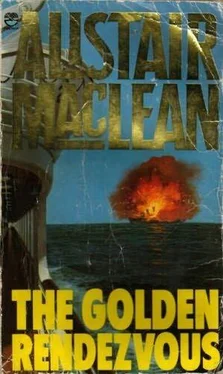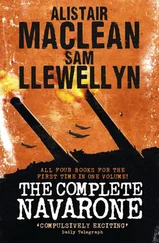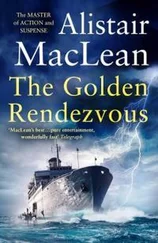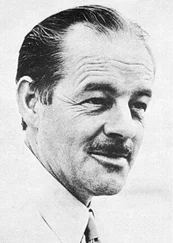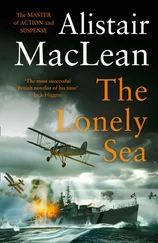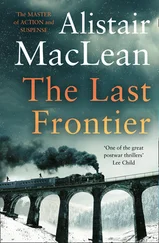“My hand is broken.” Miguel Carreras’ voice was a harsh whisper. “The forefinger is smashed; it will have to be amputated. Someone is going to pay for this.”
“I take it that is your answer,” Bullen said calmly. “Very well. Bo’sun, four heaving lines, if you please. I want those men trussed like turkeys.”
“Aye, aye, sir.” the bo’sun took one step forward, then stood stock-still. Through the open doorway had come a flat staccato burst of sound — the unmistakable chattering of a machine gun. It seemed to come from almost directly above, from the bridge. And then all the lights went out.
I think I was the first person to move. I think I was the only person to move. I took a long step forward, hooked my left arm round Tony Carreras’ neck, rammed the Colt into the small of his back, and said softly, “Don’t even think of trying anything, Carreras.” and then there was silence again. It seemed to go on and on and on, but it probably didn’t last more than a few seconds altogether. A woman screamed, a brief choking sound that died away into a moan, and then there was silence once more, a silence that ended abruptly with a violent crashing, splintering as heavy solid metallic objects, operating in almost perfect unison, smashed in the plate-glass windows that gave to the deck outside. At the same instant there came the sharp echoing crash of metal against metal as the door was kicked wide open to smash back against the bulkhead. “Drop your guns, all of you,” Miguel Carreras called in a high clear voice. “Drop them now! Unless you want a massacre.”
The lights came on.
Vaguely outlined against the four smashed windows of the drawing room I could see the blurs of four indistinct heads and shoulders and arms. The blurs I didn’t care about; it was what they held in their arms that worried me — the wicked looking snouts and cylindrical magazines of four submachine guns. A fifth man, dressed in jungle green and wearing a green beret on his head, stood in the doorway, a similar automatic carbine cradled in his hands.
I could see what Carreras meant about dropping our guns.
It seemed an excellent idea to me; we had about as much chance as the last ice cream at a children’s party. I was already starting to loosen my grip on the gun when, incredulously, I saw Captain Bullen jerk up his Colt on the armed man in the doorway. It was criminal, suicidal folly; either he was acting completely instinctively, without any thought at all, or the bitter chagrin, the killing disappointment after having thought that he had held all the cards in his hands, had been too much for him. I might have known, I thought briefly and wildly, he’d been far too calm and self-controlled, the safety valve screwed down on the bursting boiler.
I tried to shout out a warning, but it was too late; it was far too late. I shoved Tony Carreras violently aside and tried to reach Bullen, to strike down his gun hand, but I was still far too late, a lifetime too late. The heavy Colt was rearing and bucking in Bullen’s hand, and the man in the doorway, to whom the ridiculous idea of resistance must have been the very last thought in his head, let the machine gun slide slowly out of lifeless hands and toppled backwards out of sight.
The man outside the window nearest the door had his machine gun lined up on the captain. Bullen, in that second, was the biggest fool in the world, a crazy suicidal maniac, but even so, I couldn’t let him be gunned down where he stood. I don’t know where my first bullet went, but the second must have struck the machine gun. I saw it jerk violently as if struck aside by a giant hand, and then came a continuous cacophonous drum fire of deafening sound as a third man squeezed the trigger of his machine gun and kept on squeezing it. Something with the power and weight of a plunging pile driver smashed into my left thigh, hurling me back against the bar. My head struck the heavy brass rail at the foot of the counter and the sound of the drum fire died away.
The stink of drifting cordite and the silence of the grave. Even before consciousness came fully back to me, even before I opened my eyes, I was aware of those, of the cordite and the unearthly stillness. I opened my eyes slowly, pushed myself shakily up till I was sitting with my back more or less straight against the bar, and shook my head to try to clear it. I had, understandably enough, forgotten about my stiff neck; the sharp stab of pain did more to clear my head than anything else could have done.
The first thing I was aware of was the passengers. They were all stretched out on the carpet, lying very still. For one heart-stopping moment I thought they were all dead or dying, mown down in swathes by that stuttering machine gun, then I saw Mr. Greenstreet, Miss Harrbride’s husband, move his head slightly and look round the drawing room with a cautious and terrified eye. One eye was all I could see. At any other time it would have been very, very funny, but I never felt less like laughing. The passengers, perhaps through wisdom, but more probably through the reflex reaction of instinctive self-preservation, must have flung themselves to the deck the moment the machine gun had opened up and were only now daring to lift their heads. I concluded that I couldn’t have been unconscious for more than a few seconds.
I moved my eyes to the right. Carreras and son were standing just where they had been, and Tony Carreras had a gun in his hand now. My gun. Beyond them a huddled group lay sprawling or sitting about the floor. Cerdan, the “nurse” I’d shot, and three others.
Tommy Wilson, the laughing, lovable, happy-go-lucky Tommy Wilson, was dead. He wouldn’t have to worry about his mathematics any more.
It didn’t need old doc Marston and his short-sighted peering to tell me that Wilson was dead. He was lying on his back, and it looked to me as if half his chest had been shot away; he must have taken the main brunt of that concentrated burst of machine-gun fire. And Tommy hadn’t even lifted his gun.
Archie Macdonald was stretched out on his side, close to Wilson. He seemed to me to be very still, far, far too still. I couldn’t see the front of his body for he was turned away from me; for all I knew magnum slugs had torn the life out of him as they had out of Tommy Wilson. But I could see blood all over his face and neck, slowly soaking into the carpet.
Captain Bullen was the one who was sitting. He wasn’t dead anyway, but I wouldn’t have bet a brass farthing on his chances of staying alive. He was fully conscious, his mouth warped and dragged into an unnatural smile, his face white and twisted with pain. From shoulder almost to the waist his right side was soaked in blood, so soaked that I couldn’t see where the bullets had gone home, but I could see bright red bubbles flecking the twisted lips, which meant that he had been shot through the lung.
I looked at the three of them again. Bullen, Macdonald, Wilson. Three better men it would have been hard to find, three better shipmates impossible to find. They had wanted none of this, none of this blood and agony and death; all they had wanted was the chance to do their jobs in peace and quiet and as best they could. Hard-working, companionable, and infinitely decent men, they had sought no violence, thought no violence, so now they lay there dead and dying, Macdonald and Bullen with their wives and families, Tommy Wilson with his fiancée in England and a girl in every port in America and the Caribbean. I looked at them and I felt no sadness or sorrow or anger or shock; I just felt cold and detached and strangely uninvolved in it all. I looked from them to the Carreras family and Cerdan and I made myself a promise, and it was well for me that neither Carreras heard my promise or knew of its irrevocable finality, for they were clever, calculating men and they would have shot me dead as I lay there.
Читать дальше
Конец ознакомительного отрывка
Купить книгу
